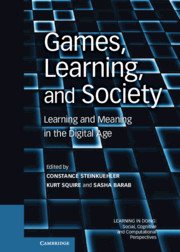Book contents
- Frontmatter
- Contents
- Contributors
- Series Foreword
- Foreword
- Acknowledgments
- Section I Games as Designed Experience
- Section II Games as Emergent Culture
- Section III Games as Twenty-First-Century Curriculum
- 17 Introduction to Section III
- 18 Prediction and Explanation as Design Mechanics in Conceptually Integrated Digital Games to Help Players Articulate the Tacit Understandings They Build through Game Play
- 19 Game-Based Curricula, Personal Engagement, and the Modern Prometheus Design Project
- 20 Discovering Familiar Places
- 21 Developing Gaming Fluencies with Scratch
- 22 “Freakin’ Hard”
- 23 Models of Situated Action
- Afterword Games and the Future of Education Research
- Index
- References
18 - Prediction and Explanation as Design Mechanics in Conceptually Integrated Digital Games to Help Players Articulate the Tacit Understandings They Build through Game Play
Published online by Cambridge University Press: 05 August 2012
- Frontmatter
- Contents
- Contributors
- Series Foreword
- Foreword
- Acknowledgments
- Section I Games as Designed Experience
- Section II Games as Emergent Culture
- Section III Games as Twenty-First-Century Curriculum
- 17 Introduction to Section III
- 18 Prediction and Explanation as Design Mechanics in Conceptually Integrated Digital Games to Help Players Articulate the Tacit Understandings They Build through Game Play
- 19 Game-Based Curricula, Personal Engagement, and the Modern Prometheus Design Project
- 20 Discovering Familiar Places
- 21 Developing Gaming Fluencies with Scratch
- 22 “Freakin’ Hard”
- 23 Models of Situated Action
- Afterword Games and the Future of Education Research
- Index
- References
Summary
Well-designed digital games are exceptionally successful at helping learners to build accurate intuitive understandings of the concepts and processes at the heart of those games owing to the situated and enacted nature of good game play (e.g., Gee, 2003/2007). Most commercial games fall short as platforms for learning because they do not help people articulate and connect their evolving intuitive understandings to more explicit formalized structures that would support transfer of knowledge to other contexts. Games hold the potential, however, to support learners in integrating their tacit spontaneous concepts with instructed concepts, thus preparing learners for future learning through a flexible and powerful foundation of conceptual understanding and skills (Clark et al., 2009a). The integration of prediction and explanation mechanics into game play potentially provides tools for supporting this extension from tacit to explicit by helping players articulate and explore the connections between the science-based dynamics present in the game and the formalized scientific principles they instantiate. This chapter explores these possibilities and proposes an example of how this might be accomplished in a physics-based game.
Background: Digital Games for Science Learning
This perspective that games provide significant potential affordances for science learning is not idiosyncratic. In 2006, the Federation of American Scientists issued a widely publicized report stating their belief that games offer a powerful new tool to support education and encouraging governmental and private organizational support for expanded funded research into the application of complex gaming environments for learning. In 2009, a special issue of Science (Hines, Jasny, & Merris, 2009) echoed and expanded this call. Later in 2009, the National Research Councilconvened a committee and workshop to explore this potential of games and simulations for science learning in greater depth.
Information
- Type
- Chapter
- Information
- Games, Learning, and SocietyLearning and Meaning in the Digital Age, pp. 279 - 305Publisher: Cambridge University PressPrint publication year: 2012
References
Accessibility standard: Unknown
- 23
- Cited by
